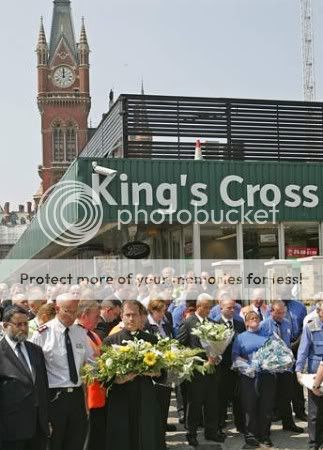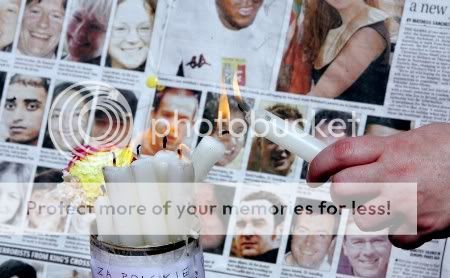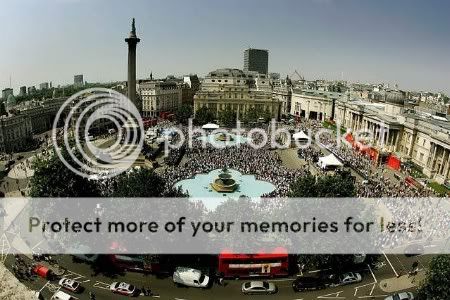LONDON (Reuters) - Office workers streamed on to the streets and traffic ground to a halt as London paused in silent tribute on Thursday, a week to the day since at least 53 people were killed in suicide bomb attacks.
The chimes of Big Ben boomed at midday across the city to mark the start of a two-minute silence that was observed across the country and elsewhere in Europe.
Black cabs and double-decker buses pulled over as an eerie silence descended on the capital.
In Paris, President Jacques Chirac's annual Bastille day television address was put back to mark the moment. In Madrid government officials stopped work, Berlin's buses, trams and underground trains halted and in Italy, television stations cut into normal broadcasting.
At the four sites where suspected Islamic militants struck underground trains and a bus, Londoners bowed their heads in grief on a swelteringly hot day. Some wiped away tears.
"I just lost one of my best mates -- but two minutes ain't going to bring him back," said Declan O'Hora, 22, contemplating the death of his childhood friend Ciaran Cassidy at King's Cross station.
Michael Harvey, a 20-year-old New Zealander who survived the bus blast, nursed a broken arm in a plaster cast and said: "I came just to show support and pay tribute to people who lost their lives. It's good that everyone came together."
Landings and take-offs were briefly suspended at Heathrow airport and financial markets paused to remember the dead.
Queen Elizabeth stood in silence at Buckingham Palace, while Prime Minister Tony Blair observed the tribute at his Downing Street residence.
"ONE CITY, ONE WORLD"
In Trafalgar Square, a giant banner declared "One City, One World." The sombre scene was in sharp contrast to last week's celebrations of London being picked to host the 2012 Olympics.
During the silence, all that could be heard was the sound of running water in the fountains. When it finished, everyone applauded.
Play was halted in the opening round of the British Open at St Andrews in Scotland as a klaxon sounded across the course. Tiger Woods stood with head bowed. The flag over the clubhouse was lowered to half-mast.
Dr Amjad Ali, standing outside the Regent's Park Mosque in London, said the bombings were a tragedy.
But he added: "How many minutes of silence would you have to observe if we had a minute's silence for people who died in Iraq, Afghanistan, Kashmir and Palestine?"
In Baghdad, Iraqi policemen huddled in a choking sandstorm at a checkpoint, bemused by the commemoration.
"Fifty innocent people died in London; it was a terrorist act of the kind we here know all too well," said 25-year-old policeman Ali Qasim as he trained his rifle over a concrete block, ready for any suicide car bomber to loom out of the murk.
"But one thing makes me wonder -- 50 people died in London and the world is astonished! What about us? Only yesterday 25 children were killed in Iraq by a suicide bomber. Are Iraqis worth less than other human beings?"
In Spain, Prime Minister Jose Luis Rodriguez Zapatero, who came to power in an election three days after the March 11, 2004 Madrid train bombings that killed 191 people, joined the two minutes of silence during a visit to Valencia.
On Indonesia's tourist island of Bali, about 150 people placed candles at the monument marking the site of the October 2002 nightclub blasts that killed 202 people. Australian and British tourists wept openly.
In Italy, government offices, railway stations and airports paused. Pope Benedict prayed for an end to terrorism during his holiday in the Italian Alps.
Berlin's transport authority ordered buses, trams and underground trains to halt for two minutes. In Paris, Chirac stood silent on the steps of the Elysee Palace.

 .
. 

